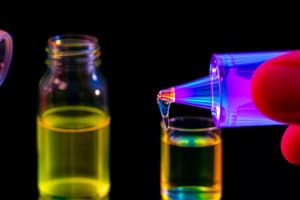Podcast
Questions and Answers
Which type of compounds are capable of absorbing radiation in the UV and VIS?
Which type of compounds are capable of absorbing radiation in the UV and VIS?
- Compounds without a chromophore group
- Organic compounds without a chromophore group
- Inorganic compounds
- Metal complexes (correct)
What is a chromophore?
What is a chromophore?
- A region in a molecule where the energy difference between two molecular orbitals falls outside the range of the visible spectrum
- A molecule that reflects certain wavelengths of visible light
- A region in a molecule where the energy difference between two molecular orbitals falls within the range of the visible spectrum (correct)
- A molecule that transmits certain wavelengths of visible light
What happens when a molecule absorbs certain wavelengths of visible light?
What happens when a molecule absorbs certain wavelengths of visible light?
- The molecule reflects light of the absorbed wavelengths
- The molecule undergoes a change in energy associated with electron transitions (correct)
- The molecule becomes colorless
- The molecule emits light of the absorbed wavelengths
What is the Lambert-Beer Law?
What is the Lambert-Beer Law?
What type of compounds have a specific absorption spectrum for isoprene?
What type of compounds have a specific absorption spectrum for isoprene?
Flashcards
Metal complexes UV/Visible absorption
Metal complexes UV/Visible absorption
Certain metal compounds absorb ultraviolet and visible light.
Chromophore definition
Chromophore definition
Part of a molecule that absorbs light in the visible range.
Molecule absorbs visible light
Molecule absorbs visible light
Electron transitions within the molecule cause absorption.
Lambert-Beer Law
Lambert-Beer Law
Signup and view all the flashcards
Isoprene absorption
Isoprene absorption
Signup and view all the flashcards




